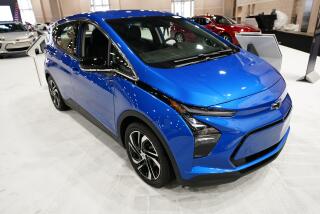Toyota tops Consumer Reports’ auto reliability survey
- Share via
Japanese automakers continue to sell the most reliable cars in the U.S., according to Consumer Reports’ latest survey.
The top seven spots in this year’s reliability report were all Japanese brands — with Toyota’s Scion, Toyota and Lexus nameplates sweeping the top spots, Consumer Reports said Monday.
With the exception of Cadillac, domestic brands — most notably Ford Motor Co. vehicles — were well below average. German brands were the best cars coming out of Europe.
Of Toyota’s 27 models, 16 earned the highest rating. The Toyota Prius C hybrid, a car Consumer Reports has criticized for a stiff ride, noisy cabin and cheap-looking interior trim, appears to be well built. It had the magazine’s top reliability score overall.
“We’re pleased with the findings, which reflect actual customer experience, not just reviewer opinion,” said Jim Lentz, chief executive of Toyota Motor Sales USA Inc. “The results also show how challenging it is to meet ever-higher customer expectations of new technology and in-car connectivity.”
Of the major automakers, Consumer Reports said Ford vehicles fared the worst, tripped up by connectivity issues, primarily with its MyFord/MyLincoln Touch electronic entertainment system.
The automaker’s Ford brand had the worst reliability of the 28 brands in the rankings save Jaguar, which perennially is at the bottom. Ford’s Lincoln brand was just one notch higher in 26th place.
“Ford’s bumpy road can be seen in the numbers. Sixty percent of Ford-branded models and half of Lincoln’s were below average in predicted reliability, and none placed above average,” said Jake Fisher, director of automotive testing for Consumer Reports.
That compares to two years ago when Ford was the most reliable domestic automaker, cracking the top 10 brands in Consumer Reports’ predicted reliability scores study. More than 90% of its models scored as average or better at that time.
The latest report attempts to predict reliability by brand for the 2013 model year and is separate from Consumer Reports’ vehicle testing analysis. It is essentially a large survey of vehicle owners who subscribe to the publication put out by the Consumer Reports National Research Center. Consumer Reports bases its predicted-reliability scores on the most recent three model years of data, provided that the model has not been redesigned for 2013.
Fisher said Consumer Reports has seen a “huge number of complaints” about Ford’s electronic infotainment and control system.
“It’s not just that it is difficult to use, it is also malfunctioning,” he said.
Ford said its own measure of consumer satisfaction with the “infotainment” system has improved since it released a software upgrade in March.
“We listen closely and value feedback on our vehicles — whether it’s from customers or third parties, such as Consumer Reports. We remain absolutely committed to continuously improving and providing the highest-quality vehicles to our customers,” the automaker said.
The reliability report came out on the same day that Toyota Executive Vice President Yukitoshi Funo told reporters in Japan that the automaker would surpass the record 9.37 million vehicles it sold in 2007 and set a new industry record for global auto sales this year.
Mazda came in fourth in the rankings, just below Lexus. It was followed by Subaru, Honda, Acura, Audi, Infiniti and Kia. The bottom 10, from best to worst, were Jeep, Volvo, Buick, Mini, Chrysler, Dodge, Ram, Lincoln, Ford and Jaguar.
The brands in the middle start with No. 11 Cadillac, followed by GMC, Nissan, Mercedes-Benz, Chevrolet, BMW, Hyundai and Volkswagen.
The annual report by the consumer magazine is closely watched by the auto industry, said Larry Dominique, executive vice president of auto price information company TrueCar.com and former head of product planning for Nissan in the Americas.
“When I was at Nissan we realized that more than 60% of consumers were influenced by Consumer Reports in one way or another; it could be the predicted reliability report or their individual model recommendations,” Dominique said.
Consumers pay attention to Consumer Reports, but the margin of difference between the brands in the report is shrinking and might not be all that important, said Jeremy Anwyl, vice chairman of auto information company Edmunds.com.
“The reality today is that cars are very reliable compared to what they were in the past. It is not something people should be really worrying about,” Anwyl said.
Buyers instead should examine features dealing with connectivity, safety systems such as collision avoidance and the ability to upgrade electronic systems on cars, he said.
“You buy an iPad and your software gets upgraded almost every week,” Anwyl said. “The auto industry has a completely different mind-set, but no survey reflects this stuff.”
More to Read
Inside the business of entertainment
The Wide Shot brings you news, analysis and insights on everything from streaming wars to production — and what it all means for the future.
You may occasionally receive promotional content from the Los Angeles Times.










